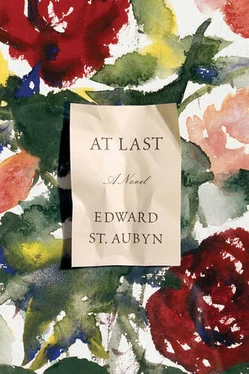He remembered going to see Eleanor just after she had launched her last philanthropic project, the Transpersonal Foundation. She had decided to renounce the frustration of being a person in favour of the exciting prospect of becoming a Transperson; denying part of what she was, the daughter of one bewildered family and the mother of another, and claiming to be what she was not, a healer and a saint. The impact of this adolescent project on her ageing body was to produce the first of the dozen strokes which eventually demolished her. When Patrick went down to see her in Lacoste after that first stroke, she was still able to speak fluently enough, but her mind had become entirely suspicious. The moment they were alone together in her bedroom, with the tattered curtains under full sail in the evening breeze, she clasped his arm and hissed to him urgently. ‘Don’t tell anybody my mother was a duchess.’
He nodded conspiratorially. She relaxed her grasp and searched the ceiling for the next worry.
Nancy’s instructions, without even a stroke to justify them, would have been the exact opposite. Tell nobody? Tell everybody! Behind the cartoon contrasts of Nancy’s worldliness and Eleanor’s otherworldliness, Nancy’s bulk and Eleanor’s emaciation, there was a common cause, a past that had to be falsified, whether by suppression or selective glorification. What was that? Were Eleanor and Nancy individuals at all, or were they just part of the characteristic debris of their class and family?
Eleanor had taken Patrick to stay with her Aunt Edith in the early 1970s when he was twelve. While the rest of the world was worrying about the OPEC crisis, stagflation, carpet bombing, and whether the crisis, stagflation, carpet bombing and whether the effects of LSD were permanent, eternal or temporary, they found Edith living in a style which made no concession whatsoever to the fifty years since Live Oak had been given to her. The forty black servants made the slaves in Gone With the Wind look like extras on a film set. On the evening that Patrick and Eleanor arrived, Moses, one of the footmen, asked if he could be excused in order to go to his brother’s funeral. Edith said no. There were four people at dinner and Moses was needed to serve the hominy grits. Patrick didn’t mind if the servant who brought the quail, or the one who took the vegetables around, served the hominy grits as well, but there was a system in place and Edith was not going to allow it to be disrupted. Moses, in white gloves and a white coat, stepped forward silently, tears pouring down his cheeks, and offered Patrick his first taste of grits. He never knew if he would have liked them.
Later, beside a crackling fire in her bedroom, Eleanor raged against her aunt’s cruelty. The scene over dinner had been too resonant for her; she could never disentangle the taste of the grits from Moses’s tears, or indeed her mother’s perfect taste from her own childhood tears. Eleanor’s sense that her sanity was rooted in the kindness of servants meant that she would always be on Moses’ side. If she had been articulate, this loyalty might have made her political; as it was it made her charitable. Most of all she raged against the way her aunt made her feel as if she were still twelve years old, as she had been when she was a passionate but mute guest at the beginning of the war, staying at Fairley, Bill and Edith’s place on Long Island. His mother was hypnotized by the memory of being Patrick’s age. Her arrested development always rigorously shadowed his efforts to grow up. In his early childhood she had been preoccupied by how much her nanny meant to her, while failing to provide him with a similar paragon of warmth and trustworthiness.
Looking up from his mother’s coffin, Patrick saw that Nancy and Nicholas were planning to approach him again, their instinct for social hierarchy turning a bereaved son into the temporary top dog at his mother’s funeral. He rested a hand on Eleanor’s coffin, forming a secret alliance against misunderstanding.
‘My dear,’ said Nicholas, apparently refreshed by some important news, ‘I hadn’t realized, until Nancy enlightened me, what a serious partygoer your Mama used to be, before she took up her “good works”.’ He seemed to poke the phrase aside with his walking stick, clearing it from his path. ‘To think of shy, religious little Eleanor at the Beistegui Ball! I didn’t know her then, or I would have felt compelled to shield her from that stampede of ravenous harlequins.’ Nicholas moved his free hand artistically through the air. ‘It was a magical occasion, as if the gilded layabouts in one of Watteau’s paintings had been released from their enchanted prison and given an enormous dose of steroids and a fleet of speedboats.’
‘Oh, she wasn’t all that shy, if you know what I’m saying,’ Nancy corrected him. ‘She had any number of beaux. You know your mother could have made a dazzling marriage.’
‘And saved me the trouble of being born.’
‘Oh, don’t be so silly. You would have been born anyway.’
‘Not quite.’
‘When I think,’ said Nicholas, ‘of all the impostors who claim to have been at that legendary party, it’s hard to believe that I knew someone who was there and chose never to mention it. And now it’s too late to congratulate her on her modesty.’ He patted the coffin, as an owner might pat a winning racehorse. ‘Which shows the pointlessness of that particular affectation.’
Nancy spotted a white-haired man in a black pinstriped suit and a black silk tie walking down the aisle.
‘Henry!’ she said, staggering back theatrically. ‘We needed some Jonson reinforcements.’ Nancy loved Henry. He was so rich. It would have been better if the money had been hers, but a close relation having it was the next best thing.
‘How are you, Cabbage?’ she greeted him.
Henry kissed Nancy hello, without looking especially pleased to be addressed as ‘Cabbage’.
‘My God, I didn’t expect to see you,’ said Patrick. He felt a wave of remorse.
‘I didn’t expect to see you either,’ said Henry. ‘Nobody communicates in this family. I’m over here for a few days staying at the Connaught, and when they wheeled in The Times with my breakfast this morning, I saw that your mother had died and that there was a ceremony here today. Fortunately, the hotel got me a car straight away and I was able to make it.’
‘I haven’t seen you since you kindly had us to stay on your island,’ said Patrick, deciding to plunge in. ‘I think I was rather a nightmare. I’m sorry about that.’
‘I guess nobody enjoys being unhappy,’ said Henry. ‘It always spills over. But we mustn’t let a few foreign-policy differences get in the way of the really important things.’
‘Absolutely,’ said Patrick, struck by how kind Henry was being. ‘I’m so glad you’ve made it here today. Eleanor was very fond of you.’
‘Well, I loved your mother. As you know, she stayed with us at Fairley for a couple of years at the beginning of the war and so naturally we became very close. She had an innocent quality that was really attractive; it drew you in and at the same time it kept you at a certain distance. It’s hard to explain, but whatever you feel about your mother and this charity she got involved with, I hope you know that she was a good person with the best intentions.’
‘Yes,’ said Patrick, accepting the simplicity of Henry’s affection for a moment, ‘I think “innocent” is exactly the right word.’ He marvelled again at the effect of projection: how hostile Henry had seemed to him when Patrick was hostile towards everyone; how considerate he seemed now that Patrick had no argument with him. What would it be like to stop projecting? Was it possible at all?
Читать дальше












